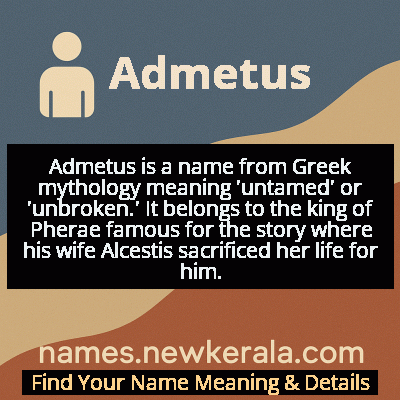Admetus Name Meaning & Details
Origin, Popularity, Numerology Analysis & Name Meaning of Admetus
Discover the origin, meaning, and cultural significance of the name ADMETUS. Delve into its historical roots and explore the lasting impact it has had on communities and traditions.
Name
Admetus
Gender
Male
Origin
Greek
Lucky Number
2
Meaning of the Name - Admetus
Admetus is a name from Greek mythology meaning 'untamed' or 'unbroken.' It belongs to the king of Pherae famous for the story where his wife Alcestis sacrificed her life for him.
Admetus - Complete Numerology Analysis
Your Numerology Number
Based on Pythagorean Numerology System
Ruling Planet
Moon
Positive Nature
Diplomatic, friendly, artistic, empathetic.
Negative Traits
Over-sensitive, moody, indecisive, prone to self-pity.
Lucky Colours
Green, cream, white.
Lucky Days
Monday.
Lucky Stones
Pearl, moonstone.
Harmony Numbers
1, 3, 4.
Best Suited Professions
Diplomats, mediators, caregivers, artists.
What People Like About You
Cooperative spirit, friendliness, artistic talent.
Famous People Named Admetus
Admetus of Pherae
Mythological King
Central figure in the Alcestis myth, known for his hospitality and being saved from death by his wife's sacrifice
Admetus of Epirus
Historical Ruler
King of the Molossians who established important political alliances through his daughters' marriages
Admetus (Literary Figure)
Tragic Hero
Protagonist in Euripides' Alcestis, representing complex themes of love, mortality, and redemption
Name Variations & International Equivalents
Click on blue names to explore their detailed meanings. Gray names with will be available soon.
Cultural & Historical Significance
The name Admetus has become synonymous with themes of hospitality (xenia) in classical studies, representing the ideal Greek host who honors the sacred guest-host relationship. His mythological narrative also provides important insights into ancient Greek attitudes toward marriage, as his relationship with Alcestis represents one of the few examples of genuine romantic love in Greek mythology. The cultural endurance of the Admetus story demonstrates how ancient narratives continue to provide frameworks for understanding complex emotional and ethical dilemmas in human relationships.
Extended Personality Analysis
The personality associated with Admetus typically combines regal dignity with emotional depth and dependency. Individuals with this name are often perceived as fundamentally good-hearted but sometimes naive about the sacrifices others make for them. They tend to inspire strong loyalty and devotion in close relationships, reflecting the mythological pattern where both Apollo and Alcestis make extraordinary sacrifices for Admetus. This suggests someone who, while fundamentally worthy of such devotion, may not fully appreciate the costs until faced with their consequences.
Modern bearers of the name often exhibit a blend of traditional values and contemporary sensitivity. They're typically diplomatic, able to maintain important relationships across different spheres of life, and possess a natural authority that doesn't rely on aggression or dominance. However, the mythological background also suggests potential challenges with self-reliance and a tendency to rely on the strengths of others during difficult times. The complete Admetus personality represents a complex balance of noble qualities and very human vulnerabilities that make them both respected and relatable figures.
Modern Usage & Popularity
In contemporary naming practices, Admetus remains an extraordinarily rare choice, typically selected by parents with strong classical education or particular interest in Greek mythology. The name sees minimal usage in birth records and doesn't appear on popularity charts in any country. However, it maintains a presence in academic and literary contexts, occasionally appearing in modern retellings of Greek myths or as a character name in works exploring classical themes. The name's complexity and strong mythological associations make it a statement choice that signals cultural sophistication rather than following naming trends. Recent increased interest in mythological names has brought slight attention to Admetus, though it remains far less common than other Greek mythological names like Orion or Atlas.
Symbolic & Spiritual Meanings
Symbolically, Admetus represents the complex interplay between human limitation and divine grace, embodying the idea that worthiness can earn extraordinary reprieves from fate. The name carries deep metaphorical significance about the nature of love and sacrifice—specifically, what it means to be worth dying for, and the psychological burden such devotion creates. Admetus symbolizes the tension between active heroism and passive worthiness, suggesting that sometimes being a good person is itself a form of heroism that inspires others to act.
The story's resolution, where Heracles rescues Alcestis from death, adds layers of symbolic meaning about redemption, second chances, and the possibility of overcoming seemingly absolute boundaries like mortality. In broader cultural terms, Admetus serves as an enduring metaphor for anyone who receives unexpected salvation through the combined forces of personal virtue, divine favor, and the love of others—a powerful symbolic combination that continues to resonate across different cultural contexts.

